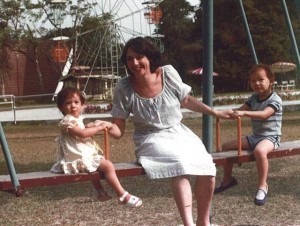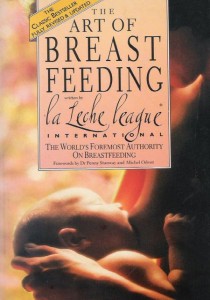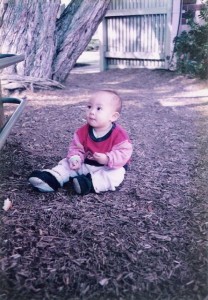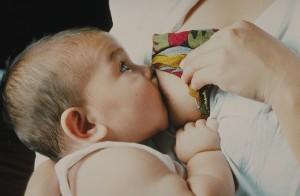Last week, we spoke to Christine Choong, founder of Mamalink and mother to three children, two boys and a girl. All her children are now grown, two are married and her daughter is expecting her first baby.
This week, Christine talks about breastfeeding and the lessons she learnt as a mother.
How can working moms cope with breastfeeding?
Most working moms breastfeed when they are with their babies and express milk when they are separated from them. This usually means expressing at least three times during work hours.
It is helpful to start a changeover program roughly two weeks prior to returning to work. Start with expressing once a day and gradually increase the number of pumping sessions every few days until mom is expressing the number of times that she will need to express while separated from her baby.
While mom is expressing, someone else can help by feeding the previously expressed milk to the baby. In this way both mom and baby can adapt to the new schedule before mom has to return to work.
Using a double electric pump enables mom to shorten the time required to express from both breasts and also provides better stimulation to the milk flow. It is important to continue with early morning breastfeeds, breastfeeds in the evening after returning from work and breastfeeds overnight.
Some babies actually change their feeding pattern, cutting down on daytime feeds and feeding more frequently in the evenings and overnight when mom is home. If this should occur, then mothers may consider co-sleeping, either with the baby in bed with her or with the baby in a co-sleeper right next to mom’s bed.
In this way, a mother can just roll over onto her side and bring baby closer in to feed. This minimises sleep disturbance, helps stimulate the milk supply and meets baby’s needs for close contact and security. Of course, when co-sleeping parents should ensure that they are meeting all safety issues.
Even before giving birth, mothers should check whether there are suitable places to express and store milk at work and also request time off during the mid-mornings and afternoons to express the milk.
It is also important to ensure that baby’s caregiver is willing to feed baby the breast milk. I can think of no good reason that babysitters would be willing to feed cow’s milk to a human baby but for some reason will not store human milk in the fridge.
Unfortunately, there are still instances where this is so.
Working moms should fully breastfeed on their days off from work. Expressing is never as good a stimulus to the milk supply as baby actually feeding at the breast. And working moms can, therefore, boost their milk supply by fully breastfeeding on their days off.
What are some of the issues that both mums and dads should be aware of in order to ensure that breastfeeding is a success?
Firstly, choose a hospital and caregiver supportive of natural birthing and breastfeeding. There are still many in the health care professions who are not aware of the impact of labour ward practices on early breastfeeding.
The first few days after birth are crucial to the success of breastfeeding and it is imperative that parents are given the right support and advice at this time. An excellent book to read on this topic is Impact of Birthing Practices on Breastfeeding by Linda Smith.
Following a natural birth, both mom and baby are very alert and, under the right circumstances, most babies will breastfeed during the first hour after birth. Dad should ensure that baby is placed on mom’s chest at the time of birth and remains there until after the first breastfeed.
Many babies will just lie on mom’s chest for around 30 minutes after birth. This is not an indication that baby is not interested in feeding. A baby who is left skin-to-skin with mom will usually start to search for the breast after about 20-30 minutes. If baby has not been exposed to medications during birth and has not been taken away for measurements, etc, she will crawl to the breast and self-attach.
This is an amazing experience for parents and usually results in problem-free breastfeeding. As birthing rooms are usually cold, blankets should be placed over mom and baby to ensure baby does not lose heat.
Both parents should educate themselves on breastfeeding as much as possible before baby arrives. It is definitely proven that when dad is knowledgeable about and supportive of breastfeeding, moms and babies succeed in breastfeeding.
Parents should try to spend time with other breastfeeding families, not just for support but also to pick up tips from more experienced parents. Try to avoid people who tell negative birthing or breastfeeding stories. If possible join a breastfeeding support network.
Early breast milk is called colostrum. It provides babies with many antibodies, coats the lining of the intestines which helps prevent allergies, and stimulates bowel movements which helps reduce jaundice.
Colostrum comes in very small quantities. It is meant to be so—baby learns to suckle on a soft breast and the digestive tract needs only deal with small quantities at first.
If baby falls asleep on the breast and cries when placed in a bassinette, it is very likely due to separation and not hunger. Babies are meant to be held close to their mothers—we are a carrying species, not a nesting species. A child can never be spoilt by being held close to mom—in fact the opposite is true. The more a young baby is held, the more secure he will be.
Breastfeeds are initially frequent and very irregular, both in terms of length and the frequency of feeding. Breast milk is produced on demand, i.e. the more frequently baby feeds, the more milk mom will produce.
Night feeds are crucial to the milk supply, particularly in the early weeks. Avoid any helpers who suggest that mom should sleep through the night while they care for the baby. New moms should sleep when baby sleeps whether night or daytime and breastfeed when baby needs to feed.
Breastfeeding should not be excessively painful—if it is, seek expert help. Nipples should not look squashed or misshapen after a feed.
You do not need to pump to see how much baby is taking. A baby will almost always milk the breast more effectively than any breast pump and, therefore, assessing milk supply on the amount expressed can be very misleading
In order to judge whether baby is taking sufficient milk look at the output i.e. wet and soiled diapers and also monitor baby’s weight gain.
Breast milk supply normally becomes well established after about six weeks, and the breasts may feel softer then.
The World Health Organisation (WHO) recommends that babies should be exclusively breastfed for six months and then, with the addition of solids, continued to be breastfed for another two years or until they wean themselves.
What were some of the most important lessons you learnt as a new mum?
Sometimes we are slow to learn! I wish I had known as much then when my children were babies, as I know now.
Don’t expect to do much in the first six weeks other than care for the children, eat and sleep—I was packing to move house with both my first and second children and it was difficult to give as much time to them as I would have liked.
Older children need special time with mom when siblings arrive—even if it is only half an hour a day of one-on-one time.
All children are different right from day one. Don’t expect them to fit the same mould and celebrate their differences.
Be willing to give as much time as you can to your children—the more time you invest, the closer your relationship.
Stay-at-home moms need to meet up with other moms. I remember being fairly new to Malaysia and feeling incredibly jealous that my husband had lunch breaks and the opportunity to converse with other adults!
Talk to your children and, more importantly, listen to them.
Eat together as a family as often as possible. This sounds old fashioned but it is a great way to spend family time, especially if everyone is busy.
Our Interview series focuses on parents, teachers, role models and children with interesting tales to tell, lives to share and inspiration to give. If you have a suggestion for someone you’d like to see interviewed (including yourself, ahem!), drop us a note at parentingworks AT gmail DOT com to tell us why the person should be featured.










